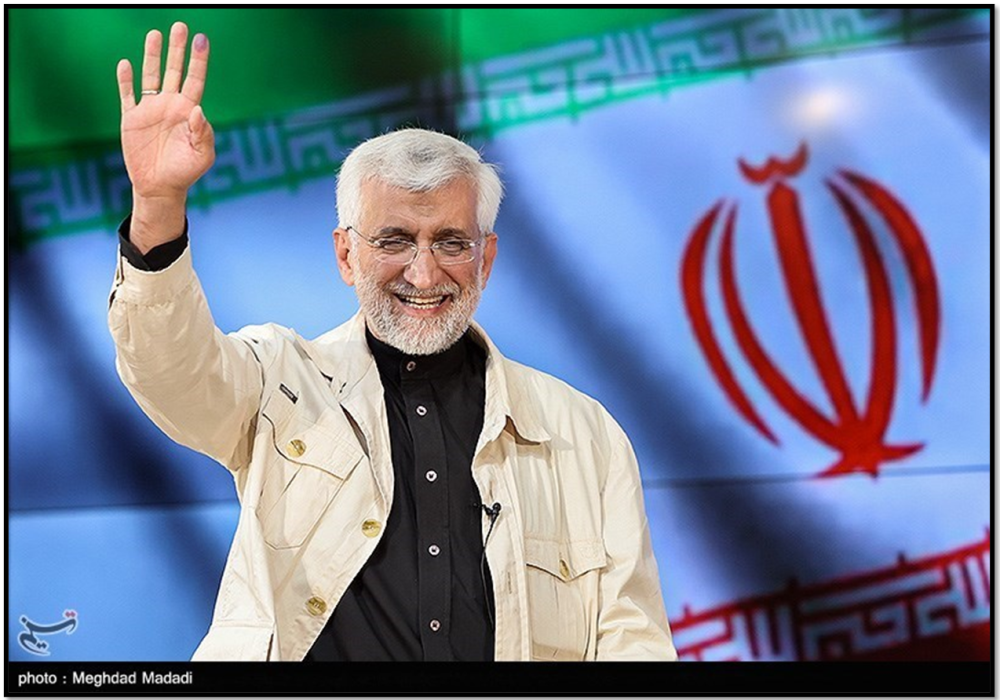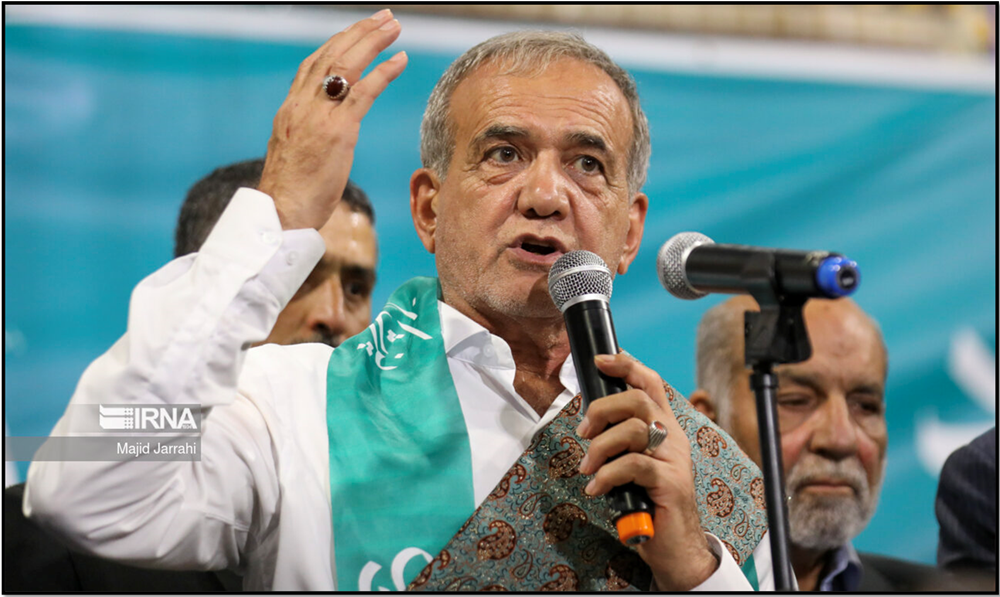The final two candidates in Iran's second-round presidential election were Saeed Jalili, a hardliner, and Masoud Pezeshkian, a reformist. Both candidates were loyal to the supreme leader and the principles of the 1979 Islamic revolution. Yet they offered disparate ideas on foreign policy, the economic crisis and U.S. sanctions, personal freedoms, corruption and government efficiency. The following are profiles and statements from the campaign organized by topic.
Saeed Jalili
Born in 1965, Jalili is a hardline diplomat and politician. He holds a doctorate in political science. During the 1980-1988 war with Iraq, Jalili volunteered for the Basij paramilitary. He earned the title of “living martyr” after he lost part of his right leg fighting on the front. In 1989, he began working in the foreign ministry and remained there for a decade. From 2001 to 2005, he was the director general of the supreme leader’s office. In 2004, he ran for a seat in parliament from his hometown of Mashhad but lost. In 2005, Jalili became an advisor to President Mahmoud Ahmadinejad. From 2005 to 2007, he was also the deputy foreign minister for European and American affairs. In 2008, he made another failed bid for a seat in parliament. From 2007 to 2013, he was both the chief nuclear negotiator in talks with major world powers as well as the secretary of the Supreme National Security Council (SNSC). During his tenure, talks failed to make progress. He had a reputation among diplomats for being dogmatic and unwilling to seriously engage.

In 2013, Jalili ran unsuccessfully for president. He came in third place in a field of six candidates, with only 11 percent of the vote. Later that year, Khamenei appointed Jalili to serve on the Expediency Council, a 13-member body that resolves disputes between Parliament and the Guardian Council. He served as secretary of the Supreme National Security Council from 2007 to 2013. He has served as the Supreme Leader’s representative to the SNSC since 2014.
On the economy
Jalili: “There must be serious financial discipline in the country's economy. Everyone should be involved in the effort, not just those benefiting from privileges.”
“If management is improved, cost issues will also be improved. We are providing money, but we don't pay attention to results. Why should we entrust management (of government) to those who incur losses?”
“Our villages have the capacity to contribute to the country's growth. People (in villages) should trust and invest in the capital market. We have 40,000 villages with more than 20 households, each of which can be a cell for a leap forward.” (June 17, 2024)
On reducing inflation
Jalili: “Inflation, especially in recent years, has been caused by the high exchange rate. Whenever the exchange rate goes up, it affects [prices of] goods. Our detailed review shows there are a set of measures in the process of controlling the currency market. We have prepared it and will implement from day one [of a new government]. If the currency market is managed, inflation will be (automatically) controlled.” (June 17, 2024)
On corruption and government efficiency
Jalili: “One of the serious problems is the slowness and the weariness of the government apparatus, which needs to be resolved.” (June 25, 2024)
Jalili: “The policy of maximum pressure failed with planning, understanding opportunities, and attracting investments. The same people who said they wouldn't negotiate with us came and made long-term agreements with us.” (June 17, 2024)
“The essence of foreign policy work is defending the rights of the people and the interests of the country. We propose new mechanisms regarding sanctions: they should not only be lifted but the sanctioning parties should regret their actions.”
“Why was economic growth zero and negative in the years when the JCPOA was signed?” (June 24, 2024)
On foreign policy and national security
Jalili: “Today, we have two main issues in the country: employment and earning foreign currency. These two should be reflected in our foreign policy.”
“Each of our embassies should be an export platform, and they should have a mission defined for employment and earning foreign currency for the country.”
“From Latin America to Africa, our neighbors, and countries in the Axis of Resistance (Iran’s network of allies across the Middle East) can create opportunities for us, we should not overlook them.” (June 24, 2024)
On the compulsory hijab and the role of women
Jalili: “We must not allow the glorious role of Iranian women in various fields to be censored.”
“Let's look at the role of housewives, why isn't their role recognized? Through proper upbringing of children and creating a safe environment within the family, they contribute to raising youth who are agents of progress in society.”
“Hijab is the dress code of women’s social presence to preserve and strengthen the sanctity of the family.”
“What our women are concerned about is why this role and position of women is constrained (in the West).” (June 21, 2024)
On helping vulnerable and disadvantaged Iranians
Jalili: “Eliminating absolute poverty is not sufficient with mere subsidies. We need to establish a welfare system across different (social) layers to achieve the sublime goal of welfare and eradication of absolute poverty.”
“The government's duty is to distribute resources in the best and most just way possible. If we compare two families in Tehran or another part of the country: one family with three cars and a four-person family without a car. The family with three cars receives 12 times more in subsidies than the family without any cars.” (June 20, 2024)
Masoud Pezeshkian
Born in 1954, Pezeshkian is a reformist politician and a cardiac surgeon. He studied medicine and surgery at Tabriz University of Medical Sciences and later became a heart surgeon at Iran University of Medical Sciences. He served as deputy health minister during President Khatami’s first term from 1997 to 2001 and then as health minister during his second term from 2001 to 2005.
In 2006, he won a seat in Parliament representing the Tabriz, Osku, and Azarshahr district of East Azerbaijan province. He was reelected four consecutive times. He served as first deputy speaker from 2016 to 2020 and headed the Azeri Caucus. Azeris, concentrated in the northwest, are the second-largest ethnic group in Iran after Persians. Pezeshkian is fluent in Azeri as well as Kurdish and has supporters among both ethnic groups.
Pezeshkian registered for the 2021 presidential election but was not cleared by the Guardian Council. He criticized the barring of candidates from elections and lack of competition. Pezeshkian was one of the few prominent reformists approved to run for Parliament by the Guardian Council in 2024. He attributed his qualification to a good word from the supreme leader.

On the economy
Pezeshkian: “The country is not to be run through conflict and disputes. I support social justice, not populist slogans. I will place the government's treasury in a completely transparent place.”
“If management is improved, cost issues will also be improved.”
“Economic issues won't be solved with slogans. It can be done only with expert work and using the experience of the world. Brains are fleeing and funds are also fleeing.” (June 17, 2024)
“Currently, our highest rate of unemployment is among university graduates. This is due to our lack of precise policymaking in line with societal needs.” (June 20, 2024)
On reducing inflation
Pezeshkian: “Governments are the main cause of inflation. Expanding the [size of] government is the most important cause of inflation. We must use the experience of other countries [in resolving economic issues].”
“Inflation means emptying people’s pockets. People sleep at night, and in the morning, they find their purchasing power has decreased.”
“The inflation rate is at 40 percent, while wages increase by 20 percent.” (June 17, 2024)
“The main cause of inflation is the government, but then they blame producers and shopkeepers for it.” (June 25, 2024)
On corruption and government efficiency
Pezeshkian: “I consider accountability and freedom of expression essential for a transparent and accountable government, free from corruption.”
“We need to improve the living conditions of teachers, police officers, workers, etc., so they can have a good life. This requires addressing the money wasted by the government, which we can stop.” (June 25, 2024)
On U.S. sanctions and the 2015 nuclear deal
Pezeshkian: “It's impossible to have a proper trading partner in the world with these sanctions.”
“No country has had economic growth without export growth since World War II.”
“Buying second-hand foreign cars has become an honor for us.” (June 17, 2024)
“I have come to rescue the people from the hardships of sanctions.” (June 25, 2024)
On foreign policy and national security
Pezeshkian: “In the region, we can be the transit route from East to West and bring most advantages. Why couldn't we achieve this? Because we are in conflict both among ourselves and with our neighbors.”
“We will secure our share of the market through dialogue with neighbors and unity and cohesion at home.”
“The defensive and deterrent power that the IRGC (Islamic Revolutionary Guard Corps) and the Iranian Army have built is a source of pride for our country.”
“One of the reasons others (enemies) cannot act against us is precisely the capability of our drones and missiles.” (June 24, 2024)
On the compulsory hijab and the role of women
Pezeshkian: “Women should be in a position where they can play a constructive role.”
“There is no difference between men and women in ideological terms. Our women can also occupy the same positions as our men.”
“We are against any coercion or harsh treatment towards anyone, let alone women.”
“Behavior won’t change with laws. Just as they couldn't forcibly remove hijab from Iranian women before, we will not be able to impose hijab on them forcefully.” (June 21, 2024)
On internet filtering and censorship
Pezeshkian: “What's the need to filter the internet? We should set it free. Twitter is a place for education, and we can teach many things through it.” (June 21, 2024)
On the government’s role in arts and culture
Pezeshkian: “The government should refrain from interference (in art and culture) and should be the policymaker and overseer of programs.”
“Government should not manage culture. This work belongs to seminaries, mosques, schools, and universities.”
“The process of obtaining permits needs to be revised so that films can participate in international festivals.” (June 21, 2024)
On helping vulnerable and disadvantaged Iranians
Pezeshkian: “We need to improve the living conditions of teachers, police officers, workers, etc., so they can have a good life. This requires addressing the money wasted by the government, which we can stop.”
“Any government intervention should benefit the disadvantaged. The laws exist but the problem is we don't implement them.” (June 25, 2024)
On diversity and minorities
Pezeshkian: “Iran is a vast country with cultural, ethnic, and religious diversity, and I have come to respect this diversity.” (June 25, 2024)
